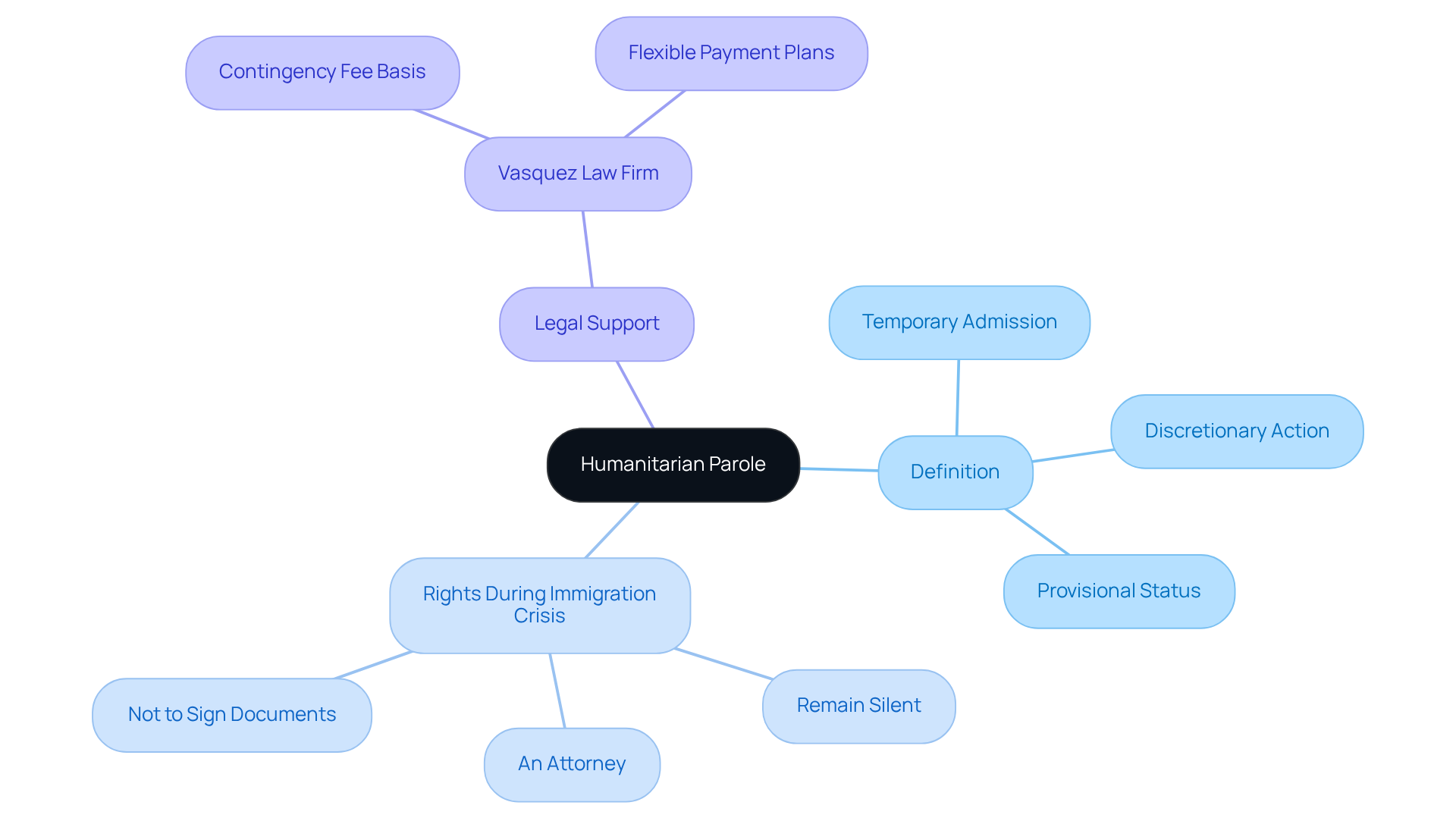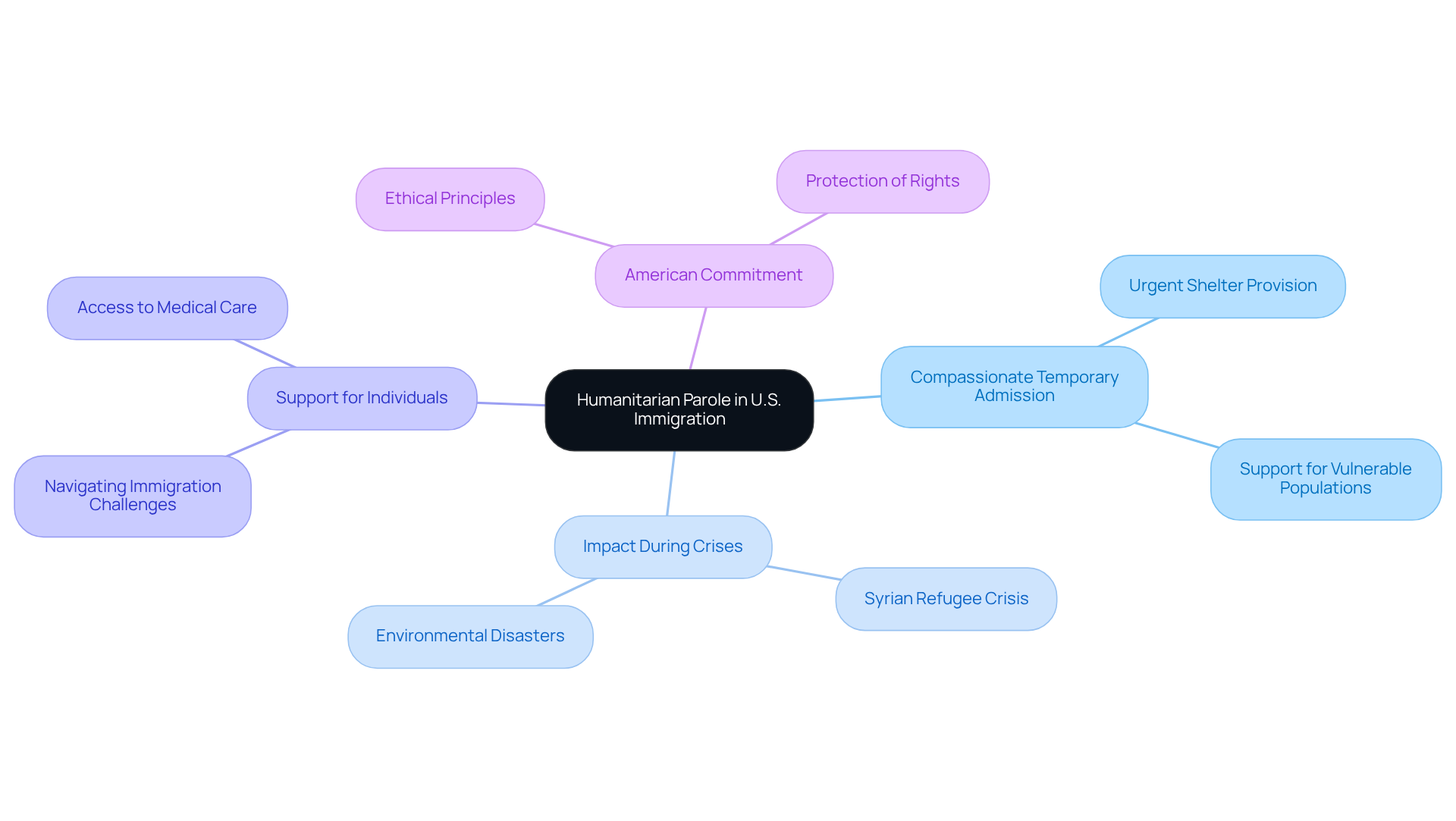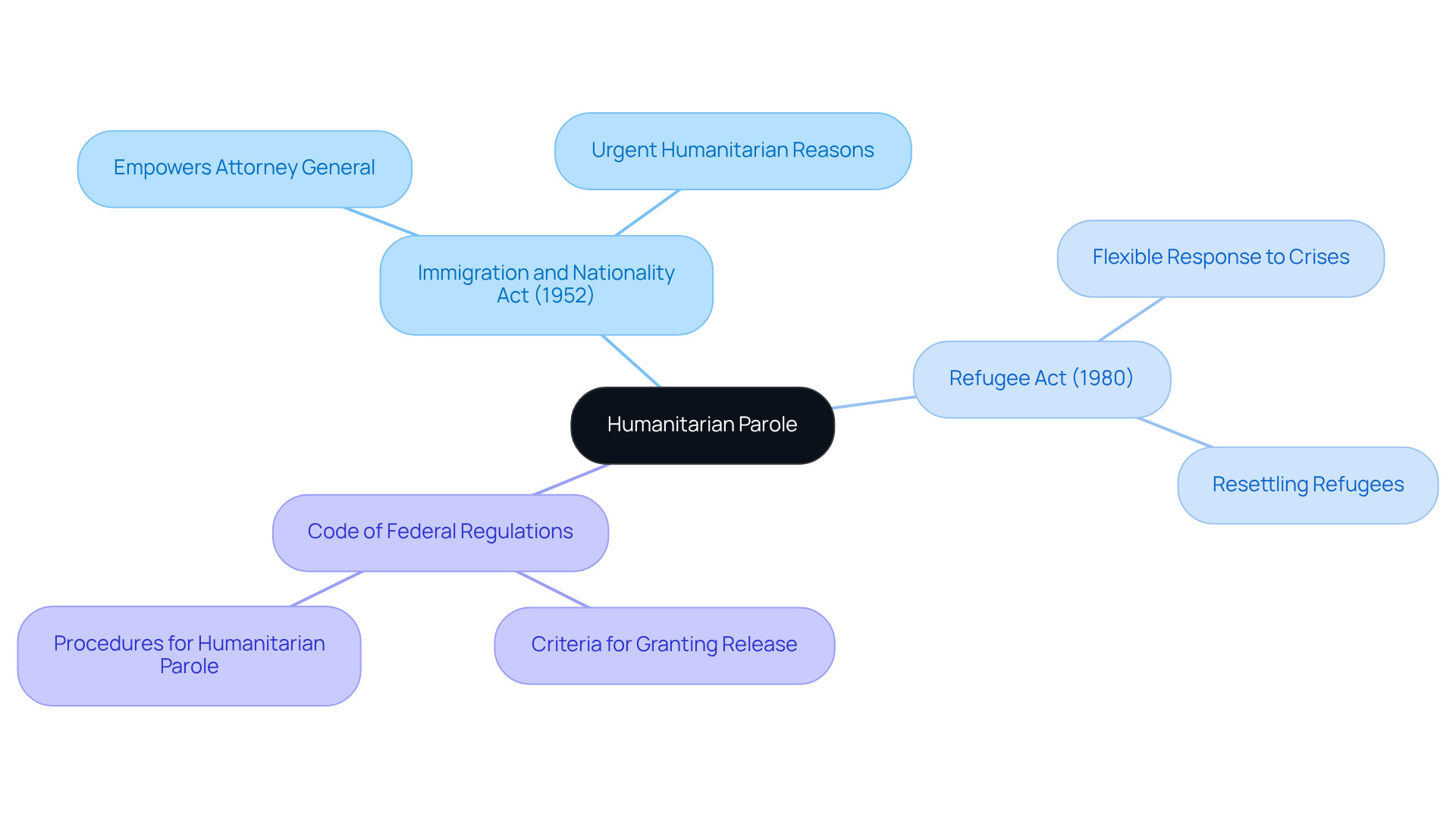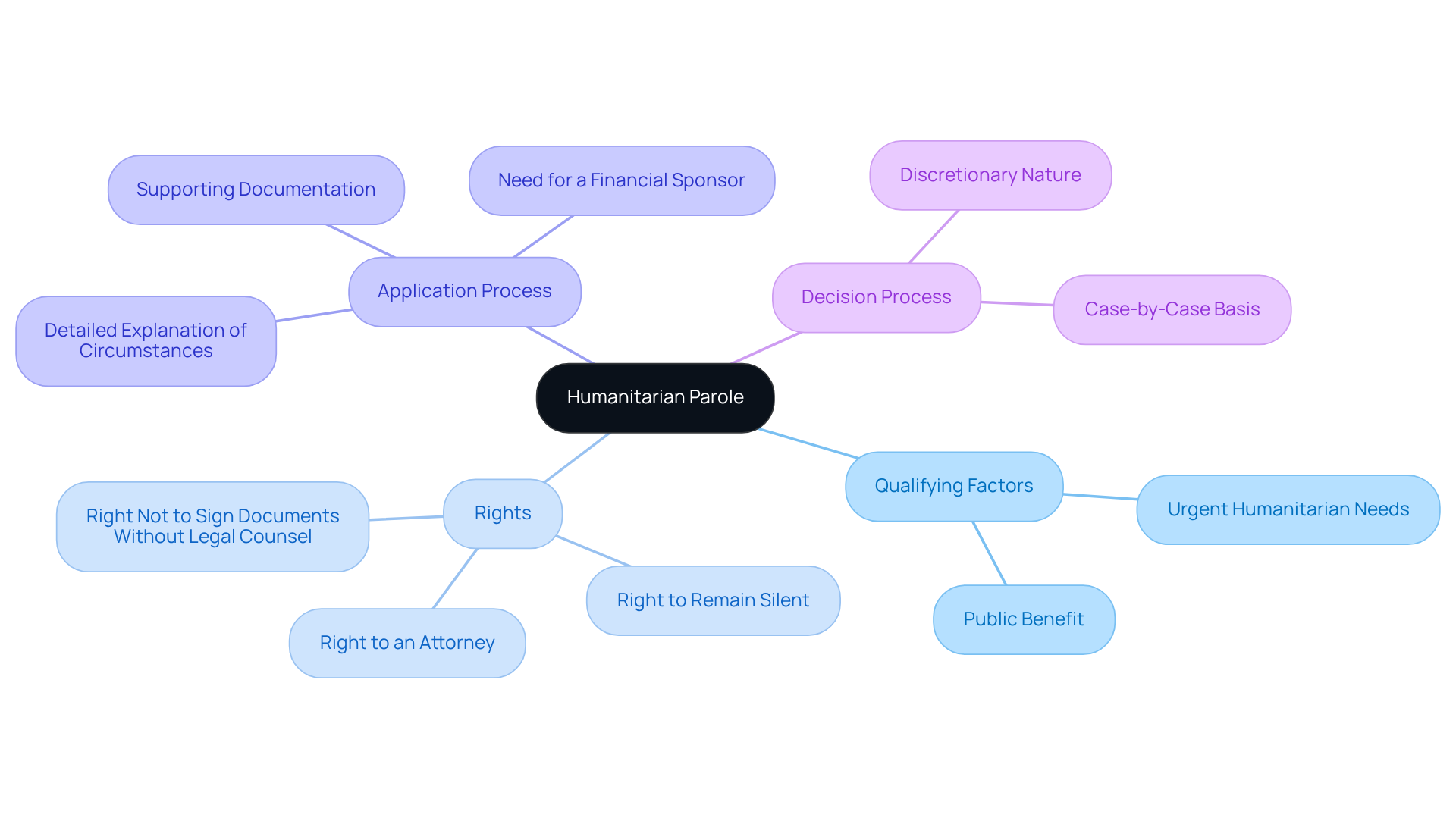Overview
Humanitarian parole is a vital immigration tool that allows individuals facing urgent humanitarian needs to temporarily enter the United States. Imagine being in a life-threatening situation, fleeing violence or medical emergencies. This mechanism, rooted in the Immigration and Nationality Act, is designed to provide critical support during such crises. It reflects America’s commitment to compassion and ethical principles in immigration policy.
We understand how overwhelming the immigration process can feel. Humanitarian parole enables faster entry for those in desperate circumstances, ensuring that help is available when it’s needed most. This isn’t just a policy; it’s a lifeline for families seeking safety and security.
It’s important to know that you’re not alone in this fight. We’re here to guide you through the complexities of immigration, advocating for your rights every step of the way. Your future matters to us, and we’re committed to standing by your side as you navigate these challenges.
Remember, when lives are at stake, every moment counts. Humanitarian parole is a testament to our shared values of compassion and support. Let’s work together to ensure that those in need receive the help they deserve. Yo Peleo — We Fight.
Introduction
Humanitarian parole is more than just an immigration mechanism; it’s a lifeline for individuals facing life-threatening situations who might not qualify for entry into the United States. This discretionary action reflects our nation’s dedication to humanitarian values, but it also underscores the challenges of navigating immigration law during times of crisis.
As conflicts and environmental disasters escalate around the globe, we must ask ourselves: how can humanitarian parole effectively meet urgent needs while adhering to legal frameworks? It’s crucial that those in peril find refuge without undermining the integrity of our immigration policies.
We understand how overwhelming this feels. You’re not alone in this fight. Together, we can ensure that compassion and clarity guide our actions, helping those who need it most.
Define Humanitarian Parole: A Critical Immigration Tool
Temporary admission is a crucial lifeline for individuals who might otherwise be ineligible to enter the United States. What is humanitarian parole refers to a discretionary action that allows entry based on pressing humanitarian needs or significant public benefit. Unlike traditional visas, temporary protective status doesn’t lead to permanent residency or formal admission; instead, it offers a provisional status that can be vital for those facing life-threatening situations, like medical emergencies or threats of violence. This option often serves as a last resort for those who can’t access other immigration pathways.
When it comes to compassionate release, understanding your rights and the immediate steps you can take during an immigration crisis is essential. You have the right to:
- Remain silent
- An attorney
- Not to sign documents without legal counsel
If you find yourself in urgent situations, such as ICE enforcement actions or deportation proceedings, it’s critical to reach out to Vasquez Law Firm right away. We’re here to provide personalized legal representation across North Carolina and Florida, available 24/7 for urgent legal assistance.
We believe that financial constraints shouldn’t stop you from seeking the justice you deserve. That’s why we work on a contingency fee basis for personal injury cases and offer flexible payment plans tailored to your financial situation. Remember, you’re not alone in this fight. We’re here to support you every step of the way.

Contextualize Humanitarian Parole in U.S. Immigration
Compassionate temporary admission is crucial in America’s immigration policy, especially during global crises. It allows the government to provide temporary shelter to those fleeing conflict, oppression, or environmental disasters. For instance, during the Syrian refugee crisis, this policy enabled urgent access for individuals needing safety and medical care. This approach not only reflects America’s commitment to ethical principles but also serves as a vital tool for managing immigration in times of crisis, facilitating quicker entry when standard visa processes may fall short.
Have you ever felt lost in the immigration process? It’s overwhelming, but compassionate temporary admission offers a lifeline. This mechanism ensures that those in dire need can find refuge and support. We understand how daunting this can feel, and it’s important to know that you’re not alone in this fight.
The American commitment to compassion shines through in these moments. By allowing faster entry for those escaping peril, we reaffirm our dedication to protecting rights and providing clarity in times of uncertainty. Remember, we’re here to fight for your family and ensure you receive the help you deserve. Your future matters to us, and together, we can navigate these challenges.

Trace the Origins and Legal Framework of Humanitarian Parole
Compassionate temporary admission has its roots in the Immigration and Nationality Act (INA) of 1952. This act empowered the Attorney General to allow individuals to enter the U.S. for urgent humanitarian reasons, which raises the question of what is humanitarian parole. Over the years, this provision has been crucial in various situations, such as understanding what is humanitarian parole in the context of resettling refugees and admitting those facing immediate dangers. Legislative changes, like the Refugee Act of 1980, have shaped how compassionate entry operates, emphasizing the need for a flexible response to crises.
Today, the legal framework governing compassionate release is outlined in the Code of Federal Regulations. This document clearly defines the criteria and procedures for granting release, ensuring that those in need understand their options.
Have you ever felt overwhelmed by the complexities of immigration? You’re not alone. We’re here to guide you through these challenging times, ensuring you know your rights and options. Remember, you don’t have to face this fight by yourself—we’re in this together.

Identify Key Characteristics and Criteria for Humanitarian Parole
Qualifying for what is humanitarian parole means demonstrating that you face urgent humanitarian needs or significant public benefit. This often involves needing temporary entry into the U.S. due to life-threatening situations, like severe medical conditions or threats of violence.
In emergencies, knowing your rights is crucial. You have the right to:
- remain silent
- an attorney
- not to sign documents without legal counsel
The application process typically requires a detailed explanation of your circumstances, along with supporting documentation. Plus, you’ll often need a financial sponsor in the U.S. who can support you during your stay.
If you find yourself facing immigration enforcement actions or other legal emergencies, immediate action is essential. Remember to exercise your right to remain silent and request an attorney. The decision regarding what is humanitarian parole is made on a case-by-case basis, reflecting the discretionary nature of this immigration tool.
We understand how overwhelming this feels. But you don’t have to navigate this alone—we’re here to fight for you.

Conclusion
Humanitarian parole is a crucial lifeline in the U.S. immigration system, offering temporary refuge to individuals caught in urgent humanitarian crises. This discretionary tool allows entry based on significant humanitarian needs or public benefits, providing essential support to those who might not qualify for traditional immigration pathways. By grasping the nuances of humanitarian parole, individuals can better navigate their options during challenging times.
Throughout this article, we’ve explored key aspects of humanitarian parole, including:
- Its definition
- The rights individuals hold during the immigration process
- The legal framework that governs its application
Knowing your rights—like the right to legal counsel and the right to remain silent—is vital. Additionally, understanding the necessity of having a financial sponsor can make a significant difference. The historical context and legislative changes surrounding humanitarian parole further highlight its role in responding to global crises and ensuring vulnerable populations receive the protection they deserve.
Ultimately, humanitarian parole is more than just a legal provision; it represents a commitment to compassion and support for those in dire circumstances. As the immigration landscape evolves, understanding the significance of this tool is essential. If you’re facing immigration challenges, remember to seek assistance and know your rights. You’re not alone in your fight for safety and dignity. The call to action is clear: stay informed, seek help, and advocate for those in need. Together, we can reinforce the values of empathy and justice within the immigration system.
We’re here to fight for your family. Your future matters to us. Yo Peleo — We Fight.
Frequently Asked Questions
What is humanitarian parole?
Humanitarian parole is a discretionary action that allows temporary admission to the United States based on urgent humanitarian needs or significant public benefit. It does not lead to permanent residency or formal admission.
Who can benefit from humanitarian parole?
Individuals facing life-threatening situations, such as medical emergencies or threats of violence, may benefit from humanitarian parole, especially if they cannot access other immigration pathways.
What rights do individuals have during an immigration crisis?
Individuals have the right to remain silent, to have an attorney, and not to sign documents without legal counsel during an immigration crisis.
What should I do if I am facing urgent immigration issues?
If you are facing urgent situations such as ICE enforcement actions or deportation proceedings, it is crucial to reach out to an immigration attorney or legal firm, like Vasquez Law Firm, for immediate assistance.
How does Vasquez Law Firm assist individuals in immigration crises?
Vasquez Law Firm provides personalized legal representation across North Carolina and Florida and is available 24/7 for urgent legal assistance.
What payment options does Vasquez Law Firm offer?
Vasquez Law Firm works on a contingency fee basis for personal injury cases and offers flexible payment plans tailored to individuals' financial situations.




